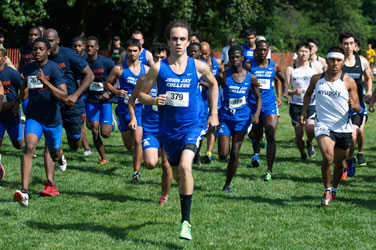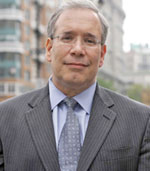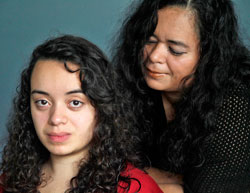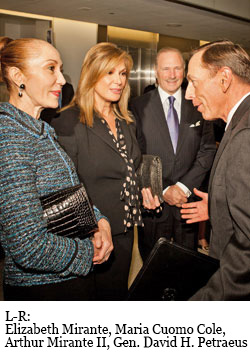|
JOHN JAY CROSS-COUNTRY TEAMS RETURN TO NCAA REGIONALS

After a tough one-point loss in the City University of New York Athletic Conference championships on October 27, the John Jay men’s cross-country team moved on to one last race of the season -- this time against the best of the East in the NCAA Division 3 Atlantic Regionals on November 16.
The team narrowly missed capturing its third CUNYAC championship on October 27, falling to the College of Staten Island by a score of 52-53. The women’s team complemented the men’s runner-up finish with a third-place performance of its own.
On the strength of their finish in the CUNYAC championships, both the men’s and women’s cross-country teams traveled to Letchworth State Park in western New York, near the campus of SUNY-Geneseo, on November 16 for the NCAA Regionals. The trip marked the first time since 2007 that the Bloodhounds were represented in the Regionals, where they faced nearly 600 other runners representing 45 other men’s teams and 42 women’s teams from New York and New Jersey schools.
In the 8-kilometer men’s race, the Bloodhounds were led by James Buckley, who ran a season-best 28:25, and Tevin Brown, whose time of 29:12 was also a season best. The team finished in 36th place. The John Jay women’s team was led by Kaitlin Hicks, whose time of 24:05 over the 6-kilometer course is a season best as well as unofficially a school record for an NCAA 6K Regional. Teammate Megan McCarthy also ran her best for the season, finishing in a time of 27:51. As a team, the women finished in 36th place.
At the CUNYAC championships in Van Cortlandt Park, three men and three women earned individual medals for their performances. Bassel Ahmad, Buckley and Brown finished second, fourth and sixth, respectively, in the men’s race, while Hicks, Margie Perez and McCarthy finished third, twelfth and fifteenth, respectively.
“I can’t say enough about the work ethic and dedication of all of our runners, men and women alike” said Head Coach Tony Phillips. “Even in the face of injuries and fatigue, they never quit, and gave everything they had in their pursuit of a CUNYAC championship and a trip to the Regionals.”
All six of the medal-winning runners in the CUNYAC championship race were named conference all-stars for the 2013 cross-country season.
_______________________________________________________________________________
John Jay Scores at the Polls, As Alumni Gain City- and Borough-Wide Offices
 |
 |
 |
 |
| Lovely Warren |
Scott Stringer |
Kenneth Thompson |
Eric Adams |
Four John Jay College alumni were elected to significant political offices on Election Day, November 5, including the first female Mayor of Rochester, NY.
Lovely Warren (BA ’00), the President of the Rochester City Council, was elected Mayor of that upstate city, winning 55 percent of the vote to thwart the reelection bid of incumbent Mayor Thomas Richards. Warren, a Democrat, also becomes the third-youngest Mayor in Rochester history.
Closer to home, alumnus Scott Stringer (BA ’86) captured 76 percent of the vote to win election as New York City Comptroller. Stringer has been serving as Manhattan Borough President, and previously represented the Upper West Side in the New York State Assembly.
Brooklyn will have a new District Attorney and a new Borough President in 2014. Kenneth Thompson (BA ’89), a trial lawyer and former federal prosecutor, was elected District Attorney with 73.5 percent of the vote. He defeated longtime incumbent Charles J. Hynes for the second time in less than two months, having upset Hynes in the September Democratic primary.
Eric Adams (BA ’98), a former New York City police captain who has served in the New York State Senate since 2004, scored 90 percent of the vote against only token opposition in the race for Brooklyn Borough President. He and Thompson are the first African Americans to hold their respective offices.
_______________________________________________________________________________
Fierce Advocate for the Undocumented
 For junior Angy Rivera (left), the path to a college degree has been a roller coaster. In addition to the typical challenges of being a student and planning one’s future, Rivera’s college life is underscored by an all-encompassing issue: she is one of tens of thousands of young people living in this country who are undocumented immigrants. As a consequence, she is unable to obtain such things as a driver’s license, state identification, working papers and federal financial aid for higher education. For junior Angy Rivera (left), the path to a college degree has been a roller coaster. In addition to the typical challenges of being a student and planning one’s future, Rivera’s college life is underscored by an all-encompassing issue: she is one of tens of thousands of young people living in this country who are undocumented immigrants. As a consequence, she is unable to obtain such things as a driver’s license, state identification, working papers and federal financial aid for higher education.
Rivera, whose major is Culture and Deviance Studies with a minor in Human Services, came to the United States from Colombia when she was three. She grew up in the U.S., attending elementary school and graduating from high school, and all the while aware that she and her mother were undocumented. But the reality of her immigration status did not affect her until she attended an Open House in 2009 at John Jay and met with a financial aid advisor. Rivera recalled she was told that she could not apply for student aid because she was undocumented.
“I experienced great shame and embarrassment as a result of that meeting, and it was then that I decided I needed to change my situation,” said Rivera. “I needed to take action and find out about my opportunities. I came across the New York State Youth Leadership Council (NYSYLC), and I learned about the DREAM Act. I realized I could change the reality I was living.”
Rivera has become active in speaking out against injustices committed against undocumented people. In 2010, she and the NYSYLC organized the first Coming Out of the Shadows rally, which has become an annual event. Every March, in front of press, cameras and hundreds of onlookers, individuals come forward with stories about their immigration status.
Rivera says the act of telling one’s story publicly relieves an emotional and psychological burden of secrecy, and can be empowering. Rivera and the NYSYLC have lobbied Congress to pass the DREAM Act, which failed in the Senate by five votes. They participated in a hunger strike, mobilized for the New York DREAM Act, and they hold many clinics and workshops about Deferred Action for Childhood Arrivals, the policy that would suspend deportation of undocumented youth and provide them with working papers for two years.
“Being undocumented has been a catalyst to motivate me to do something because you can either stay stuck in that situation and feel bad for yourself, or you can do something about it,” she said. “I have faced all these uncertainties and injustices, and I was able to channel all that sadness, all that loneliness and find a community.”
In 2012, Rivera had started a business selling homemade bracelets to pay for her college tuition, and promoting them on Twitter and Facebook. A newspaper reporter wrote an article about Rivera and her situation, which was spotted by a retired MTA worker who then made an anonymous donation to pay for a whole semester for Rivera.
Rivera will next be the subject of a documentary, “No Le Digas A Nadie” (“Don’t Tell Anyone”) that is scheduled for release next year. “Everybody can be a fierce advocate for justice,” she asserted. “Everyone can do something about their situations, but not everyone does. It’s just about tapping into that power and pushing yourself to do something.”
_______________________________________________________________________________
Bringing Therapy Through Theater to Inmates in Thailand & Teachers in Rwanda

Professors Use Sociodrama as a Prison Rehabilitation Tool
Two John Jay professors traveled to Thailand this past summer to lead a workshop at the tough yet progressive Ratchaburi Central Prison, where they used sociodrama to involve the incarcerated women in developing scenarios based on situations and conflicts they may encounter.
“I was deeply moved by the insight, creative talent and appetite for learning expressed by these inmates. They blossomed into a cohesive group, dissipating the shyness, gloom and deprivation that occur in prison,” said Professor Lorraine Moller, a member of the Department of Communication and Theatre Arts. “Therapies such as drama, yoga and narrative therapy give both women and men a voice and a channel in which to express themselves. Research tells us that drama programs, specifically, may teach emotional literacy, empathy and social competence, and assist in institutional adjustment.”
The inmates participated in writing the plays and the musical accompaniment, in addition to performing roles.
“It was unbelievable,” observed Professor Baz Dreisinger of the English department, who is Academic Director of the Prison-to-College Pipeline Program at John Jay. “For Lorraine and myself, this trip exceeded our expectations of not only getting to learn about their criminal justice and prison system and their issues surrounding women, but actually being able to impact it in some small way. The teams we worked with showed themselves to be enormously progressive. We both were stunned, impressed and moved.”
Dreisinger and Moller were invited to present at a “Prison on the Move” conference organized by Senior Researcher Dr. Napaporn Havanon and Program Director Jirapa Sintunava, and presided over by Her Royal Highness Princess Bajrakitiyabha. Attendees included executives and directors from the Thai Ministry of Justice, Department of Corrections and hundreds of inmates.
The princess visited John Jay in May 2009 to broaden her knowledge of criminal justice issues. Moller arranged for the princess to tour the Bedford Hills Correctional Facility for Women, where she visited the Infant and Puppy programs. At the time, the princess’s Kamlangjai Project in Thailand focused on developing programs for the Ratchaburi prison, with the idea of setting a positive standard of care for incarcerated women. The princess’s positive experience at John Jay encouraged her to invite Moller and Dreisinger to lead a workshop at the facility.
“The relationship between re-entry and rehabilitation during incarceration remains of paramount importance if we expect to lower the recidivism rate,” said Moller. “It is my profound belief that the work of rehabilitation occurs from the first day of incarceration.”
Moller said programs in the arts teach skills that are essential not only for intellectual growth and job placement, but for the repair of the social and cognitive damage that result from incarceration.
A team of scholars from the Kamlangjai Project, under the leadership of Dr. Napaporn, will visit John Jay in November.
“Studying another culture is the most profound way to develop multiple perspectives, an essential skill in the global age,” said Moller.
Applied Theater Offers Hope to War-Ravaged Rwanda
Professor Amy Green, Deputy Chair of the Interdisciplinary Studies Program, brought the transformative power of theater to the war-torn central African nation of Rwanda on a three-week research trip this past summer.
Green worked with graduate students and faculty from the Master of Arts in Applied Theater (MAAT) at the CUNY School of Professional Studies to bring theater workshops to Rwanda, in hopes of expanding and sustaining venues for expression, dialogue and communication in a country that lost up to a million men, women and children during a genocidal civil war in 1994.
This is the first year Green joined the MAAT Team’s Project Rwanda, which for the past four years has visited the Kigali Institute of Education (KIE), Rwanda’s public teacher training institution, to share applied theater techniques and pedagogy. Applied theater is an umbrella term for interactive performance-based activities that are practiced outside traditional theater spaces with nontraditional participants and audiences for education, social change and development.
In the aftermath of the genocide, the Rwandan Government created an initiative to expand channels of communication in a country that previously had been insular and isolated. The government has invested in radio stations, laid fiber optic cables, added TV stations and, most significantly, added a drama requirement to the national curriculum to increase citizen’s communication skills and provide a forum for dialogue about the future of the country. In 2010, KIE initiated a drama specialization for its teachers-in-training, but the country had no qualified teachers in drama or theater practice. Through a series of connections, KIE and MAAT found each other and launched their ongoing partnership. This year, the students who were freshman in 2010 are graduating and will become Rwanda’s first cohort of drama teachers.
Green’s agenda this summer was to research, observe and document the project, interview KIE students, faculty and administrators, and begin a critical assessment of the collaboration so far.
Although Rwanda doesn’t have a tradition of drama, there is an extensive tradition of music and dance, which Green described as, “very graceful, with complex harmonies and fluid movements” that refer to the culture’s rich agricultural tradition. “In fact,” she noted, “one of the great pleasures of the trip was the way the KIE students sang and danced together often and as naturally as walking.” The learning experience for both the MAAT and KIE students included an afternoon of cultural exchange in which they taught one another songs and dances from their respective countries.
Green pointed out that many of the KIE students survived the genocide but had lost their families and had witnessed horrible violence. They are eager to help rebuild their country and create a brighter future for their own generation. “The hunger of these students and the way they drank it all in, and how they gave themselves so freely was amazing,” she said. “While on the surface, it looks like everything is great, but there is still a lot of pain. Rwanda has few marketable natural resources, so they are investing in their people. They are making education the priority, which is brilliant, but underneath all that entrepreneurial spirit there is this wounded people.”
The enthusiasm and willingness of the Rwandan students to embrace the applied-theater techniques and use them to deal with difficult themes “was a moving tribute to the strength of the human spirit,” Green said. “These young people are so positive. They are totally committed to the idea that they can and will make a new and better society. It will be fascinating to see what role interactive applied theater can play in realizing and maintaining that dream.”
_______________________________________________________________________________
2013 Gala Is a Salute to Veterans
 The annual Educating for Justice gala sponsored by the John Jay College Foundation Board of Trustees offered a festive salute to the many students and alumni who have served in the military, and honored four prominent New Yorkers for their service and leadership in the area of veterans issues. The annual Educating for Justice gala sponsored by the John Jay College Foundation Board of Trustees offered a festive salute to the many students and alumni who have served in the military, and honored four prominent New Yorkers for their service and leadership in the area of veterans issues.
Held on October 16 at the College, the gala drew a crowd of some 300 friends and supporters of John Jay. The event’s honorees were Gen. David H. Petraeus, former head of the U.S. military’s Central Command and former Director of the Central Intelligence Agency, and Arthur and Elizabeth Mirante II. Arthur Mirante is a Principal and Tri-State President of Avison Young, and former CEO of Cushman & Wakefield. In addition, a Civic Leadership Award was presented to Maria Cuomo Cole, Chair of the homeless-services organization Help USA.
“From the very beginning, John Jay has been a home to veterans,” noted President Jeremy Travis. “Today, I am proud to report, John Jay is home to more veterans among our student body than any other City University campus. They are an amazing asset to our College community, bringing to the College their outstanding work ethic, goal orientation, spirit of teamwork and a commitment to the common good.”
Approximately 500 military veterans study at John Jay. In his welcoming remarks at the gala, President Travis said that the time he spent with before the event with Petraeus and some two dozen John Jay student veterans was “one of the highlights of my presidency.”
Accepting his award from President Travis, Petraeus, who now teaches at CUNY’s Macaulay Honors College, noted that the post-9/11 generation “has deservedly come to be recognized as America’s newest ‘great generation.’” We can and should do more to aid their transition back into civilian life, he said, “and it’s great to see John Jay and CUNY doing just that.”
President Travis praised Cole, the Civic Leadership Award recipient, for her “humanity, passion and humility.” The award was presented in recognition of her efforts, through Help USA, to support America’s military veterans, “notably those who have returned from duty only to find themselves homeless.”
Jules Kroll, chairman of the John Jay Foundation board, presented the award to the Mirantes, who have been staunch financial supporters of the John Jay-Vera Fellows Program for outstanding undergraduates committed to public service and social justice. Kroll cited the Mirantes as prime examples of “what it means to be a fierce advocate for justice.”
Nearly 300 friends and supporters of John Jay attended the 2013 gala, which serves as a prime vehicle for private support of programs and initiatives at the College.
_______________________________________________________________________________
SUPREME COURT JUSTICE SOTOMAYOR TO HIGHLIGHT 2014 CONVOCATION
Surprise Announcement Caps Presidentís State of the College Address
Associate Justice Sonia Sotomayor of the U.S. Supreme Court will be the featured speaker at a Convocation in September 2014 to launch the College’s 50th anniversary celebration, President Jeremy Travis revealed in his State of the College address on November 4.
“I am thrilled beyond words,” President Travis said after making his surprise announcement, noting that Sotomayor “has graciously agreed to share with us her vision of justice, her stirring story of accomplishment, and her inspirational example for our students. Imagine the excitement when Justice Sotomayor comes to our campus!”
The President’s State of the College address, which has become a fall-semester tradition, was a celebration of recent successes as well as a sketch of the road ahead. “We can justifiably take pride in the progress we have made toward realizing our high ambitions for John Jay,” Travis observed. “This progress is the result of a lot of hard work.” He paid tribute to the “dedication and creativity” of faculty and the contributions of professional staff “who are, without a doubt, the best in the university.”
Among the highlights of the past year — “indicators of the strength of our College” — Travis cited the Middle States reaccreditation initiative, an influx of new faculty, the launch of a new General Education curriculum, a student-approved increase in the student activity fee, and a successful enrollment effort that exceeded target numbers, including the first class of 20 students in the Macaulay Honors College.
“We have much to celebrate in our progress over the past few years,” Travis said, “[but] this year also provides a uniquely appropriate time to think carefully about the road ahead.”
The President spelled out what he termed “three realities” that he said need to be addressed: the need to take a fresh look at ways to increase undergraduate enrollment, coupled with a focus on initiatives that will increase retention and graduation rates; the approaching end of the era of incremental tuition increases; and the College’s “untapped potential” to generate more revenue, through graduate and professional programs, online education and external revenue sources.
“As we look at the progress at John Jay over the past several years, we can see the fruits of our labor,” Travis said. “We can see an institution transformed — because we decided to take on the challenge of creating a new John Jay that respects our past and is true to the enduring mission of educating for justice.”
[Click here to read the entire State of the College address.]
_______________________________________________________________________________
FACULTY & STAFF NOTES
Presenting. . .
Michele Doney (Math and Science Resource Center) gave a presentation on October 25 titled “Assessing Effectiveness & Outcomes: Ideas for Producing Quantitative Data,” as part of the ATP Webinar Series of the Association for the Tutoring Profession.
Robert McCrie (Security, Fire and Emergency Management) and his former student, Seungmug (Zech) Lee, now a professor at Western Illinois University, presented their research on 71 fatal school shootings since 1966 at the annual meeting of ASIS International. The shooting incidents involved assailants ranging in age from 10 to adulthood, and result in more than 250 deaths and 350 serious physical injuries.
Itai Sneh (History) presented his paper “Post 9/11 Constitutional Perspectives on Torture: Did the Prohibited Become the Norm?” at the Fourth Annual Constitutional Law Colloquium, sponsored by the Loyola University Chicago School of Law on November 1.
Delores Jones-Brown (Law, Police Science and Criminal Justice Administration) presented at Yeshiva University on Constitution Day, September 17, on the controversial police practice of stop-question-and-frisk. Jones-Brown also spoke at Johns Hopkins University and at Goucher College on September 26 on "Policing, Race and Public Safety: The Implications of Stop-and-Frisk.” In addition, Jones-Brown was a panelist on “Current Constitutional Issues: Stop and Frisk, the Fourth Amendment and Policing in New York City” as part of the 8th annual CUNY Black Male Initiative Conference: Race, Law and Justice, and moderated the panel “Anatomy of a Drug War: Criminal Justice and Collateral Damages” for the Challenging Punishment Conference, sponsored by the Institute for Research in African-American Studies at Columbia University.
The Printed Page
Janice Bockmeyer (Political Science) published her chapter, “Shrinking Cities, Growing Adversaries: The Politics of Territory for Community Nonprofits in ‘Shrinking City’ Planning Processes,” in the book Schools and Urban Revitalization: Rethinking Institutions and Community Development, edited by Kelly L. Patterson and Robert M. Silverman, and newly published by Routledge.
Lucia Trimbur (Sociology) has had her new book, Come out Swinging: The Changing World of Boxing in Gleason’s Gym, published by Princeton University Press. The book is the culmination of 12 years of research into the 76-year-old gym and the sport of boxing, and how the two dovetail with race and gender issues, socioeconomics, prisoner reentry and more.
Adam Berlin (English) has a new novel in print, with another about to hit the bookshelves. Both Members of the Club, published by Texas Review Press and winner of the Clay Reynolds Novella Prize, has been hailed as “astonishingly personal and touching,” dramatizing the ordeal of boxing “without romance, without ideal, but also without apology.” Berlin has also written the post-9/11 novel The Number of Missing, which was November 15 by Spuyten Duyvil Press. In it, he uses the events and tragedy of 9/11 as a lens to examine the process of contending with death, unresolved conflicts, regret, torn friendships and new love severed at its beginnings.
Claudia Zuluaga’s (English) debut novel, Fort Starlight, was published in September by Engine Books. The novel, hailed by Publisher’s Weekly as “absorbingly, expertly written,” is set in the swampy wetlands of south Florida, where Zuluaga explores the unexpected ebb and flow of people’s lives when their dreams and expectations are thwarted.
Recognition
Glenn Corbett (Security, Fire and Emergency Management) has been appointed by Philadelphia Mayor Michael Nutter as chairman of a Special Independent Advisory Commission to review and evaluate the city’s Department of Licenses and Inspections. Among other charges, the 13-member commission will look into the department’s handling of a June 5, 2013, building collapse in Philadelphia in which six people were killed and 14 others injured.
Joseph J. Gulinello (Security, Fire and Emergency Management) received the 2013 International Presidential Award of Merit from the American Society for Industrial Security. The award was presented on September 24 at the organization’s annual conference in Chicago.
Kimora (Law, Police Science and Criminal Justice Administration) was featured in the September 17, 2013, issue of Business Insider in an article titled "The 25 Best College Professors in America."
|

